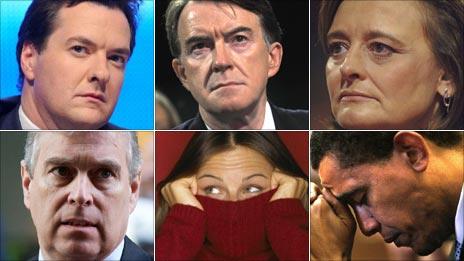The trouble with embarrassing friends
- Published
- comments

Prince Andrew has been criticised for the company he keeps. But should public figures be held to account for their friends and acquaintances?
You've probably got one too. The friend you can't take anywhere. The one who always says or does the wrong thing.
You can't just drop them. They're your friend, after all. But deep down, you worry that sooner or later they're going to get you into trouble.
To many the issue will be a familiar one. But it takes on an extra level of significance when you're the Duke of York and the UK's special representative for international trade and investment.
Prince Andrew has faced a storm of criticism over his friendship with US tycoon Jeffrey Epstein, who was jailed for sex offences. He has also been attacked for lunching at Buckingham Palace with a member of the former Tunisian regime and accused in Parliament of taking a holiday with a Libyan gun-smuggler.
His private secretary insists any suggestions of impropriety are "without foundation".
But the prince is one of a slew of public figures to have his choice of acquaintances held up to public scrutiny.
The social circles of leading politicians fell under the spotlight in 2008 when both George Osborne - then shadow chancellor - and Lord Mandelson, at the time the EU's trade chief, denied any impropriety when it emerged they had enjoyed the hospitality of a Russian millionaire on his yacht.
Cherie Blair, the then prime minister's wife, was attacked for her closeness to the fitness guru Carole Caplin - especially after it emerged that Ms Caplin had introduced the Blairs to Peter Foster, a convicted conman who helped the couple buy two flats. They insisted they knew nothing of his criminal record.
It's not just within UK politics that friendships are so sensitive. In his 2008 election campaign, Barack Obama's closeness to the Reverend Jeremiah Wright threatened to derail the former's bid for the presidency after footage emerged of racially inflammatory sermons delivered by the pastor.
President Obama has also come under fire for his associations with convicted fraudster Tony Rezko and William Ayers, a member of the 1960s radical group the Weather Underground, which carried out a domestic bombing campaign.
His predecessor-but-one Bill Clinton was also widely condemned over his decision in 2001 to pardon the fugitive financier, Marc Rich, whose wife had donated money to Mr Clinton's presidential library.
All of the above examples suggest a friendship can easily become a handicap for a public figure. Even where there is nothing dubious in the friend's history, an unrevealed business can throw up the mirage of a conflict of interest.
But the Times columnist and former Conservative MP Matthew Parris wonders whether it is really realistic to expect public figures to fully vet the backgrounds of their acquaintances before accepting them as friends.
He fears that such expectations will push an increasingly risk-averse political class - already drawn from a narrow social stratum - even deeper into insulation from the real world, with all its flaws, failings and foibles.
"Politicians can't win," he says. "If they're very callous and drop any friends who might embarrass them, we'll criticise them for being cold and calculating. But if they don't, we go on about how they've committed a gaffe.
"There's always a conflict between behaving decently in your private capacity and properly in your public capacity.
"To behave appropriately as a public person will very often mean you behaving inappropriately as a private person. I'm inclined to be sympathetic to those who put their private obligations first."
And it's not just the obvious public figures whose lives are under scrutiny - royals, politicians, judges, and clergy. Everyone from headteachers to sport stars can find themselves in trouble for an inappropriate friendship, or a suspected conflict of interest.
When private collides with public, however, there will always be those who believe a public figure's primary responsibility must always be to the latter.
Kevin Maguire, political commentator and associate editor of the Daily Mirror, warns that as far as MPs are concerned, it is extremely difficult to determine where friendship ends and nepotism begins.
For this reason, he says, politicians' networks and circles need to be accountable.
"You talk to the most humble backbencher and they tell you that they get invited to all these fantastic, lavish receptions - it's not because they're wonderful people, it's because they've got influence," he says.
"If they're just hanging out with fabulously wealthy people it means they're only being exposed to that section of society's point of view.
"I don't mind them being friends with teachers or local government workers or people who do real jobs. But we could do with fewer old Etonians and bankers having influence over our politics."
However high their expectations of their leaders' social activities, the general public may well be gaining a first-hand understanding of what it is like to be under scrutiny.
Psychotherapist Lucy Beresford says having one's friendships dissected in public is traumatic enough for the famous and powerful.
But she warns that, in an age where all our connections are itemised and accessible to all on social networking sites, who we choose to be friends with puts us in the firing line as never before.
"With things like Facebook, we think that we're in control of the information that gets put out there," she warns.
"But then someone comes along and says: 'You've a friend, a Joe Bloggs, he's a bad person - therefore you're a bad person too.'
"In extreme cases it could be quite destabilising. But on the other hand, it could be quite positive if it acts as a wake-up call."
Your loyalties to that embarrassing friend of yours may be tested further than you expected.
- Published26 January 2011